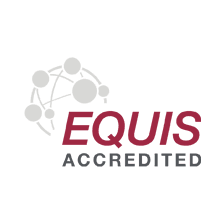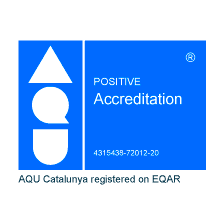
Obtain the most up-to-date knowledge and practices to manage any area of public administration, design public policies, and innovate in government and public management with the only official master's degree in Spain specialised and designed for the Latin American region. Acquire extensive knowledge and a prestigious official European degree, designed for an international audience, through an online, dynamic and flexible methodology that includes a classroom phase.
This official master's degree is endorsed by the Spanish Ministry of Education and the Pompeu Fabra University, the first Spanish university and the 15th best university in the world (of those with less than 50 years of history), according to the Times Higher Education ranking. In turn, the UPF Barcelona School of Management has the EQUIS accreditation, the most prestigious institutional recognition for business schools worldwide. All this guarantees an internationally prestigious education and rigorous learning about the current reality of the public sector in Latin America.
In the Online Master in Public Administration and Government in Latin America you will learn the practical tools for the design of government structures and public policy instruments, and you will learn to improve governance and innovation in public management in all its aspects: information and communication systems, planning, control, evaluation and accountability of public institutions.
You will understand how government systems and public management have evolved in recent years, in order to improve the efficiency and effectiveness of policies and their management, as well as to promote sustainable and territorially integrated social development.
The program will focus on the study of the specific needs of each country or region’s social and institutional reality in order to subsequently define public intervention strategies based on the introduction of political and institutional innovation systems adapted to the socio-political context.
The objective of the master's degree is to offer you practical training to contrast theoretical, conceptual and modeling knowledge with the possibility of its real application in the social environment.
You will delve into topics such as:
- Design and institutional evaluation of government structures.
- Enhancement of governance improvement processes.
- Analysis of the legal-economic system as a reference for the introduction of political-administrative improvements.
- Design, implementation, and evaluation of public development policies in Latin America.
- Introduction of innovation in Public Administration: organization, human resources, information and communication systems, planning, control and evaluation.
- Improvement in processes of participation and accountability of Public Institutions.
The master's program proposes a 5-day stay in Barcelona, scheduled for January 2024. The objective is to provide you with experiences that will inspire you and allow you to reflect on how to improve and innovate in the Latin American context.
Why choose this program
Obtain an official qualification from an accredited school
Study at a school accredited by EQUIS, an international distinction that guarantees the quality of our institution and makes us the 1st school of management linked to a public university with this accreditation in our country.
Specific content for Latin America
This is the official program with the most specialized content focused on the Latin American region offered in Spain. All content is currently applicable, as we review it periodically so that you get the latest knowledge, skills, tools, and techniques to take your career to the next level.
Program 100% online
We offer you online training, through a very simple platform, fully compatible with your work or family responsibilities. In this way, you can organize your schedules, learning at your own pace and from anywhere in the world. In addition, you will develop all the necessary skills for the current work context: technological management, work with a diversity of nationalities, time zones, experiences and sectors.
Reference teachers in Public Administration
You can count on teachers of the highest academic level and recognized international trajectory, such as the directors of the program, Carles Ramió, David Sancho and Miquel Salvador, who will accompany and inspire you to achieve your professional goals.
International week and networking
In January, we propose you to participate in an international week in Barcelona, in which you will have face-to-face classes with experts in Public Administration and Government and in which you will be able to expand your international contacts by meeting with professors and colleagues of more than 10 nationalities.
Who is it for?
The Online Master in Public Administration and Government in Latin America is aimed at university graduates who wish to specialize in the improvement and innovation of governance dynamics, as well as professionals in government public administration, cooperation and development in Latin America.
The master brings together political leaders and public managers from different areas of government in Latin America, as well as specialists in public management, cooperation and development who seek to delve into the political-institutional reality in Latin America.
Accreditations
The UPF Barcelona School of Management is the management school of Pompeu Fabra University, the 1st Ibero-American university and the 16th placed university in the world, among those under 50 years of age, according to the Times Higher Education ranking.
UPF Barcelona School of Management has EQUIS accreditation, the most prestigious institutional recognition for business schools globally, and places itself among the top business schools in the world.
The Master in Public Administration and Government in Latin America is an official master's degree and has the academic recognition of the Ministry of Education of the Government of Spain. The Quality Agency of the University System of Catalonia (AQU) has also institutionally accredited UPF-BSM. This accreditation certifies all the official master's degrees that we teach and recognizes the quality of our educational model in accordance with the criteria of the European Higher Education Area (EHEA).
Curriculum
The Online Master in Public Administration and Government in Latin America structures its contents into 11 subjects that will be taught online over 14 months.
During this period, a practical course is proposed, which corresponds to the week in Barcelona. It is planned for January 2024, so that once the program has started, participants can advance in the contents and dynamics of the master's program, as well as meet and start a more intense interaction with their classmates and professors. During these 5 days of face-to-face classes, master sessions, conferences and workshops will be held, and participants will present their proposals for the development of the Master's Final Project or Thesis, in order to receive personalised feedback from the management.
- The administrative organization in the political system: the functions of public powers in contemporary States.
- Political relationship and administration in Latin America.
- Public intervention through the provision of public services.
- State models and criticism of the public sector.
- New Public Administration and Latin America.
- Reference administrative models and traditions in relation to Latin America.
- Globalization of reference points and reform of the public sector.
- The modernizing waves of Latin American Public Administrations.
- Political science as the backbone of the study of democracy.
- Elements of analysis of democracy, institutions, actors and political processes.
- Social analysis.
- The power and the state.
- The perspective of institutional analysis.
- The reform of the State in Latin America.
- Social cohesion in Latin America: the conceptual debate.
- Panorama of social inequity in Latin America.
- Ethics and the fight against corruption in the public sphere.
- Limited resources and growing demands on the part of the citizen.
- The reform of the state in Latin America.
- The great options and configurative elements of decentralization processes.
- The centralist tradition in Latin American politics.
- Crisis of governance, decentralization and reform of the State in Latin America.
- Crisis of the nation-state and territorial distribution of power.
- The development of local governments in Latin America.
- Local autonomy and the importance of local politics.
- Institutional capacities and subnational governments.
- International organizations and the dynamics of interaction between countries in the region.
- Co-operation and integration in international trade.
- The phenomenon of regional economic integration.
- International co-operation organizations in Latin America and the Caribbean.
- Main regional integration processes in Europe, Latin America and the Caribbean.
- Political Science as the backbone of the study of public policy and Public Administration.
- The analysis of public policies as an analytical approach to Political Science.
- The design, implementation, and evaluation of policies.
- The definition of service offer.
- Characteristics of services.
- Servuction: factors to consider in the definition of the service.
- Fight against inequality.
- The policy of promoting the labour market and job placement.
- Social policies and their impact on economic development in Latin America.
- Concept of economic development in the context of decentralization in Latin America.
- Public policy networks in development.
- Typologies of public action programs for development.
- Regulation as an arena for political interaction.
- Independent regulatory agencies in Latin America in the international context.
- Outsourcing of services and external hiring, and the specificities in Latin America.
- New relationship models in the external provision of services.
- The concept of project planning.
- Programing techniques.
- Cost-benefit analysis in Public Administration.
- The problems of Public Administrations in Latin America.
- Institutional empowerment strategies.
- The basic dimensions of an administrative structure.
- Organizational structures.
- Basic elements of the servuction approach.
- The approach to operational management of services.
- Production of services and new paradigms of public management.
- The organizational culture of public management.
- Neoinstitutionalism and human resource management analysis.
- Basic characteristics of international civil service systems.
- Models in Latin America.
- Personal management and people management.
- The human resources management sub-systems.
- Planning, management and evaluation of the human resources system.
- The evaluation of the performance of human resources.
- The implementation of a management model for professional skills.
- Leadership, management, and control in public administration and public services.
- The mission and public utility. Demand in public services.
- The inclusion of demand in the public action agenda.
- The networks of actors in the public sphere.
- Environmental analysis techniques.
- The concept of quality of service.
- The establishment of quality indicators and quality circles.
- Participatory design: quality circles.
- ICT in Public Administrations, digital government and open government.
This module corresponds to the International Week in Barcelona, which consists of 5 days in Barcelona. During this period, intensive sessions combining academic content with visits to Spanish public institutions are planned.
The contents of these sessions include: critical review of the governance models analysed and generation of debate on their applicability in the Latin American environment, visits to political-administrative institutions at different levels of government and public-private partnerships, and personalised tutoring of participants.
The topics to be developed will be related to the contents worked on in the different subjects and will be developed in morning and afternoon sessions at the University's facilities, as well as at the headquarters of the different institutions to be visited during the stay in Barcelona.
These face-to-face classes have the participation of collaborating teachers with diverse profiles (academics, managers and professionals who have led relevant experiences in different fields of management and public policies) and combine different teaching methodologies such as: lectures, group debates and reflection sessions, workshops, case studies, visits and discussions on real experiences with the protagonists who have developed them.
This week also aims to promote a face-to-face meeting that favours both the generation of new dynamics and connections between students and teachers, as well as the possibility of learning directly about relevant experiences from other countries and regions.
- Definition and object of study.
- Description and diagnosis of the chosen public policy or organization and its institutional framework.
- Specific proposals for action.
- Implementation of change proposals.
- Conclusions and recap.
A video must be sent with the presentation of the Project once it is finished, which will be evaluated by the academic directors.
Complementary activities
The NAME also includes the possibility of participating in practical activities and activities for personal and professional growth such as:
- Online Module BSM Inside: BSM Inside is a transversal and interdisciplinary module, common to all UPF Barcelona School of Management masters and postgraduate programs, which has been conceived to work on a set of key competencies for professional development in conjunction with the real needs of today's organisations. This module runs throughout the academic year and is made up of 3 areas of knowledge that constitute the identifying features of UPF-BSM: Communication, Entrepreneurship and Innovation, and Planetary Wellbeing and Humanities. All the subjects of the BSM Inside module are 100% online and have been designed as self-learning subjects: from the first day of the subject and until the end of the term you will have all the teaching materials available in the eCampus and you can work with the material and the different activities it contains, at your own pace, according to your availability and in a self-organised way.
- International mobility program: We offer you the possibility of extending your studies at another top international institution during the academic year following the completion of your Master's degree. Places are limited.
Qualification obtained
Once students have completed the course they will obtain the Màster Universitari en Govern i Gestió Pública a l'Amèrica Llatina - Máster Universitario en Gobierno y Gestión Pública en América Latina official Master's Degree, issued by the Pompeu Fabra University.
Issuance of official Master's Degrees: The amount stipulated in the DOGC (Official Gazette of the Government of Catalonia) must be paid for the rights to issue the degree. This rate varies annually and the rate in force at the time of application for the degree will be applied.
Faculty
The master is designed and taught by Carles Ramió, David Sancho and Miquel Salvador, academics with extensive experience and national and international recognition in the field of government and public management (especially in Latin America), and professors from the Department of Political and Social Sciences of the University Pompeu Fabra.
In addition, you will be able to get in touch with other experts and international references in the field during the on-campus week in Barcelona.
Academic directors
Faculty
Collaborating faculty
- Isabel Bazaga
PhD in Government and Public Administration from the Complutense University of Madrid where she graduated with a degree in Political Science and Sociology. She is a permanent researcher at the Instituto Universitario de Investigación Ortega y Gasset (UCM). Her research and consultancy activity is linked to the development of public organisations and she is a specialist in institutional consolidation processes from a strategic perspective. She has specialised in security policies and participates in national and international projects which object of study is public security, especially the prevention of violent radicalisation and the fight against terrorism. - Quim Brugué
Professor of Political Science at the University of Girona (UdG). Researcher on democratic innovation and modernisation of public policies in the Research Group in Applied Social Sciences of the UdG. He has been General Director of Citizen Participation at the Generalitat de Catalunya and Director of the Institute of Government and Public Policy. - Manel Cienfuegos
Professor (A) of Public International Law and European Union Law at Pompeu Fabra University. PhD in Law from Pompeu Fabra University. Master in European Studies from the Institut Universitari d'Estudis Europeus of the Universidad Autónoma de Barcelona. Licence spéciale en Droit européen from the Institut d'Etudes Européennes de la Université Libre de Bruxelles. Visiting professor at several European and American universities and consultant for European and American organisations. - Jacint Jordana
Professor of Political Science, specialist in comparative public policy issues with a special focus on regulatory policies and their specialised institutions. He holds a degree in Economics and Political Science from the University of Barcelona. In 1992 he obtained his PhD in Economics from the University of Barcelona (Cum Laude and Extraordinary Prize). Since 2005 he has been Professor of Political Science and Administration at the Pompeu Fabra University (UPF) in Barcelona. Since 2005 he has directed the Institut Barcelona d'Estudis Internacionals. Visiting Professor at the Copenhagen Business School, Australian National University, Wissenschafts Zentrum Berlin and the University of California (San Diego), among others. He is a member of the editorial board of several Spanish and international journals devoted to political science, public management, governance and regulation. His research interests include collective action and policy networks, regulatory agencies and regulatory governance, telecommunications policy and the political economy of Latin America. - Josep Lluis Martí
Professor of Philosophy of Law at Pompeu Fabra University. Degree in Law (1997) and PhD in Political and Social Sciences (2004) from the same university. He has been coordinator of the Advanced Master in Legal Sciences (2010-2016) and the Master in European and Global Law (2016-2017), and member of the Internal Committee for the Ethical Review of Projects (CIREP) and the Electoral Board of the University. He has been principal investigator of a research project on "Democratic culture and new forms of citizen participation" (2013-2016), and is currently co-principal investigator of a research project of the National Plan of R & D + i on "Justice, legitimacy and globalization institutions "(2016-2019). He is co-editor of the journal Law, Ethics and Philosophy (LEAP). He has been a Laurance S. Rockefeller Fellow at the University Center for Human Values at Princeton University (2008-2009) and a visiting professor at the University of Richmond (2014). He currently leads a multidisciplinary research project entitled Global Democracy Project, which studies ways to democratise global and international institutions, and the development of legitimate spaces of global governance. His other main lines of research include republicanism, deliberative democracy theory and new technologies in the service of citizen participation. - Manuel Villoria
Professor of Political Science at the Universidad Rey Juan Carlos de Madrid (URJC), where he directs the Observatory on Good Governance. He has 5 sexenios of research/transfer. He holds a PhD in Political Science and Sociology from the Complutense University of Madrid, a degree in Law and a degree in Philology, and is the author of more than two hundred scientific publications. He is a member of the Scientific Council of the international organization CLAD. President of the Ethics Committee of the Spanish Olympic Committee (COE), Secretary of the Ethics Commission of the UGT and member of the Ethics Committee of the Bilbao City Council. Co-founder and member of the Board of Directors of Transparency International-Spain. He was also President of the Association +Democracia and is a member of its board of directors. He participates as a researcher in the E-Democracy Research Program of the Community of Madrid.
Methodology
At the UPF Barcelona School of Management we are committed to a flexible and dynamic online model, which aims to place the participant at the centre of the process so that they are the owner of their learning process.
To facilitate your day-to-day management and the achievement of your academic objectives, you will have 24/7 access to the virtual environment so that you can organize your studies without schedules and at your own pace.
In this way, you will acquire instrumental and aptitudinal knowledge and skills, combining your training with your work and personal life, making the most of the time you have available.
Interactive teaching materials
Various materials and formats will make your experience more motivating: videos, case studies, content maps and downloadable resources. Designed and updated periodically by professionals and experts in the field, they put at your disposal the latest knowledge, skills, and tools to take your career to the next level.
Active and collaborative learning
Participation and discussion with your classmates and teachers are essential to the collaborative learning process. We will provide you with various tools such as the Discussion Forum, where you can propose new topics for debate, comment on and answer questions presented by the teacher or respond to interesting comments.
Streaming sessions with experts
Through videoconference sessions with the expert teacher or special guests, you will be able to ask questions, discuss your learning and connect in real time as if you were all in the same place. To ensure the flexibility of the training, we record the sessions so that you can refer to them if you have not been able to connect.
Personalized help
You will have the support of the expert tutor, who will guide you through each didactic unit; the help of the coordinator and the program manager in the delivery of activities, qualifications, management of procedures or access to services, and the guidance of the career advisor in the improvement of your personal brand and the search for professional opportunities.
Mentor
Throughout the program, you will develop your Final Project and, for this, you will be assigned an expert mentor on the subject, who will be in charge of advising you and supervising its development until the final presentation and defence.
Evaluation
The activities and evaluation dates of each of the subjects in the program will be detailed at its start.
The program's evaluation tests will be established and corrected under the quality criteria required in all UPF Barcelona School of Management programs, which guarantee their academic value and recognition.
The evaluation of the program will be carried out online on the basis of:
- Resolution of practical cases oriented to business reality
- Knowledge tests for each subject
- Proactive participation in forums and debates
- Realization and presentation of a Final Project
Tools
The learning process is characterized by its flexibility, since, in the virtual learning environment, the structure of the school calendar and the diversity of multimedia resources which are made available to the student allows them to acquire knowledge in a self-regulated manner.
The support of the teaching staff and interaction with classmates is carried out by making use of a wide variety of communication channels that facilitate proximity and didactic dialogue.
Professional Future
The program brings together professionals with a minimum of 10 years of accredited work experience in the public sector and/or companies providing public services both nationally and internationally. The program is designed to train you in all areas of public management and in trends and good practices in order to implement improvements, changes, or introduce innovation to them.
In addition, we are increasingly receiving candidates from the private sector and academia who are interested in making their foray into public administration or increasing their knowledge in this area in order to improve the connections between their institutions and the regional or national public administration.

Student profile
The master's degree brings together students of more than 10 nationalities and of various academic and professional profiles, mostly from the Latin American public sphere, such as political leaders, public managers from different governmental fields and specialists in public management, co-operation and international development.
Due to the high international participation, the program offers great networking opportunities with other professionals in the sector, in order to create links and synergies with experts and peers.
Average age
Number of years of professional experience
Students from Latin America
Students with previous studies in Law or Advocacy
Students with work positions in management of areas, departments, or general management
Career opportunities
You can count on our Talent UP professional development program from Professional Careers, a training complement designed to increase the value and positioning of our students in the professional market. This program provides you with tools and resources, through individual career counseling, training activities, company events, and career opportunities.
- Management of Public Organizations: State, Regional, Local and International Administration
- Management of Non-Governmental Organizations and International Organizations
- Management of consulting companies, and collaborating companies and contractors with the Administration
- Functions of Strategic Management, Management of Organization and Human Resources, Management of Analysis and Evaluation of Programs
- Training of professionals dedicated to Public Administration.


